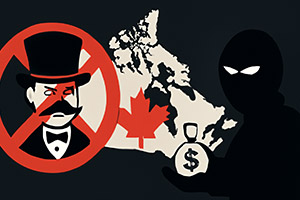 The black market’s grip on Canada’s iGaming landscape has permanently changed how the industry operates. According to Paul Burns, president and CEO of the Canadian Gaming Association (CGA), monopoly models are no longer viable due to the long-standing dominance of grey market operators in the country.
The black market’s grip on Canada’s iGaming landscape has permanently changed how the industry operates. According to Paul Burns, president and CEO of the Canadian Gaming Association (CGA), monopoly models are no longer viable due to the long-standing dominance of grey market operators in the country.
CGA: Monopoly Models No Longer Viable in Canada
Burns, speaking with GGB magazine, explained that regulated online gambling has been undermined for decades by widespread unlicensed activity. “Because of the large unregulated iGaming market presence in Canada, no one’s had a monopoly for 25 years and that’s the reality,” he stated.
While Alberta recently passed its iGaming Act and Ontario launched its regulated market back in 2022, most of the country continues to operate under outdated frameworks. These legacy models remain in provinces such as British Columbia and Québec, both of which maintain provincial monopolies for online gambling, including table games, lottery, and bingo.
In Atlantic Canada, the monopoly model persists through a regional lottery structure across New Brunswick, Newfoundland and Labrador, Nova Scotia, and Prince Edward Island.
Despite these models, Burns emphasized the urgency for change: “There’s this whole discussion going on around sweepstakes and predictive markets in North America, [but] the next thing is already here, and there’s more coming,” he said. “As a regulator, there’s no time to pause anymore.”
Ontario Sets the Bar as Alberta Prepares to Compete
Ontario has emerged as the benchmark for successful market liberalisation. The Alcohol and Gaming Commission of Ontario recently estimated the province had achieved an 84% channelisation rate—indicating that the majority of iGaming activity has transitioned to regulated platforms.
Data from H2 Gambling Capital places this figure even higher at 93%, up from 83% in 2023. Still, 20.2% of players on licensed sites are also gambling on unregulated ones.
Burns credits Ontario’s strategy of incorporating former grey market operators into its framework. “One of the things Ontario did [well] was build a market that invited the grey market operators and made it advantageous” for them to join, he said.
He believes Alberta is now following a similar path. “Alberta is clearly leading with strong measures of consumer protection. It’s this balance of being prepared to invest heavily in protecting your market and making it advantageous for people to join the regulated market. Ontario set a good bar, but we’re asking them to improve on that regulatory regime.”
Currently, PlayAlberta—a government-run platform—captures only about 20% of Alberta’s market. The expectation is that this will improve with the implementation of the new regulatory structure, giving PlayAlberta the tools to compete with private operators.
Burns also confirmed discussions are underway with regulators in Québec and British Columbia about transitioning to regulated iGaming models similar to Alberta and Ontario.
Responsible Gambling Amendments Rejected in Alberta Bill
As Alberta moves toward commercial online gambling, its legislature has chosen not to strengthen responsible gambling requirements in law. On April 30, 2025, amendments proposed by the NDP were rejected during the Committee of the Whole’s review of the iGaming Alberta Act. The proposed changes aimed to establish a harm-reduction approach, mandatory independent evaluations, and annual reporting on RG effectiveness. The final vote was 38 against and 16 in favor.
MLA Gurinder Brar, one of the amendment sponsors, had urged the inclusion of a standalone RG program. However, Service Alberta Minister Dale Nally countered that such safeguards are better managed by regulatory bodies rather than codified into law. He stressed that this approach would allow the government to make quick adjustments as needed.
Under the bill, a new Alberta iGaming Corporation will be formed to oversee online gambling operations. The Alberta Gaming, Liquor and Cannabis Commission (AGLC) will maintain its regulatory authority.
Although the NDP’s amendments failed, the bill is still moving forward. Nally has reiterated that Alberta’s plan is not to expand gambling but to regulate what is already a thriving underground market. Consumer protection measures like a self-exclusion program will be part of the framework, with the intent of extending existing land-based safeguards to online platforms.
Experts like University of Calgary’s David Hodgins have voiced the need for further tools, including spending limits and behavior tracking. Meanwhile, charitable organizations have raised concerns that a commercial model could reduce revenues. Nally argued, however, that unregulated offshore gambling already diverts funds from local causes, and the aim is to retain that revenue within Alberta.
With a young, digital-savvy population and high gambling participation rates, Alberta is poised to establish a robust and competitive online gambling sector. The province expects to have its market fully regulated by early 2026.
Source:
“No more monopolies in Canada’ due to black market, says Canadian Gaming Association chief”, igamingbusiness.com, May 12, 2025



















